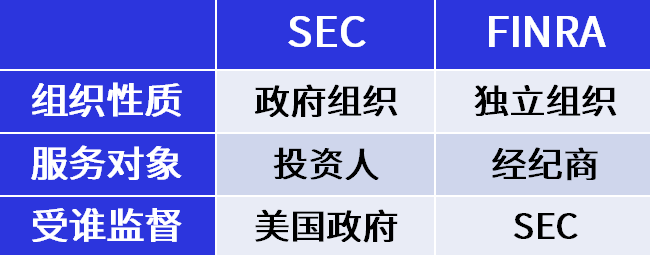What is the SEC??What is your position in the global financial market??
The SEC is one of the nation's largest securities trading regulators, responsible for protecting investors from market manipulation and deception in order to maintain the normal operation of the capital markets.。
In 1929, when the United States was experiencing the Great Depression and many people were desperate about the capital markets, the U.S. government established the Securities and Exchange Commission (SEC) to save the economy.。Since its inception, the SEC has dealt with many large and small trading violations, and over the past 80 years has been refining rules and amending regulations to maximize investor protection.。

What is SEC??
The SEC is the United States Securities and Exchange Commission, full U..S.The Securities and Exchange Commission is an independent federal government regulator responsible for protecting investors and the order and operation of the securities market in order to promote capital development.。
Established in 1934 as the first federal regulator of the securities market, the SEC encouraged full disclosure and protected investors from market fraud and manipulation, in addition to overseeing corporate takeovers in the United States.。
Generally, securities issued in the United States must be registered with the SEC before they can be traded by investors。Financial services companies (such as brokers) must also be registered with the SEC in order to operate.
History of the SEC
In 1929, the United States was in the midst of the Great Depression, when many securities became worthless and information transmission technology was underdeveloped, leading to a lot of fake news that made investors lose confidence in the stock market.。
In order to restore confidence in the stock market, the United States passed the Securities Exchange Act and established the SEC to ensure the authenticity of companies and their businesses, and to require securities dealers, managers, and exchanges to be open to investors and treat investors in the market fairly.。
Since its inception, the SEC has annually punished institutions or individuals for violations of the Securities Exchange Act, and has even worked directly with the Department of Justice to address these misconduct (including accounting fraud, fake messaging, or insider trading).。
How the SEC Works
The SEC's main business is to oversee the actions of organizations and individuals in the securities market, including exchanges, brokers, fund companies, and more.。
Through established regulations, the SEC hopes to promote the public disclosure and sharing of market information, fair trading and prevent fraud, and it will provide investors with registration statements, financial statements or other collated information through data collection, analysis and retrieval (EDGAR) to ensure that the information received by investors is the most accurate.。
The SEC has five members, including the chairman, whose mandates are all designated by the President of the United States, and each serves a five-year term, which can only be extended for another 18 months after the five-year term expires until the next candidate is found.。In order to maintain the independence of the SEC from the government, the law requires the membership of the SEC, and no three people can be from the same political party.。
The current SEC Chairman is Gary Gensler, who took office on February 3, 2021.。
The SEC's organizational structure is composed of five departments and 23 offices to maintain the essence of securities law, enforce actions, promulgate new rules, supervise and coordinate securities agencies and all levels of government.。
- Division of Corporate Finance (Division of Corporate Finance): to ensure that investors can be presented with the right important information, such as corporate financial prospects, stock prices and other information, so that investors can make the right choice。
- Division of Enforcement: Investigating cases under the U.S. Securities and Exchange Act, if there is a violation, the Division will open civil and administrative proceedings.。However, the SEC only allows civil lawsuits to be filed in federal and administrative courts, and criminal cases must be enforced by the U.S. government's Department of Justice, but sometimes the SEC works with U.S. government agencies to provide assistance to keep cases going.。
In civil litigation, the SEC has two main sanctions:
- Promulgation of injunctions: i.e., a strict prohibition on the continued commission of an offence by an individual or organization in the future, which can result in imprisonment or a fine if the injunction is ignored or the rules of contempt of court are flouted.。
- Fines and recovery of illegal profits: In exceptional cases, the SEC will request an order from the U.S. Department of Justice to prohibit or suspend the offender's authority within the organization。It is also possible to file administrative lawsuits for SEC insiders to hear; the SEC sometimes serves as the first level of appeal for FINRA and NYSE。
- Division of Investment Management: oversees investment firms, insurance products and investment advisers。
- Division of Economic and Risk Analysis: Integrating Economic Data Analysis into the SEC's Core Mission。
- Division of Trading and Markets establishes and maintains order, fairness and efficiency in markets。
Deeds of SEC Behavior
Passing the Sabine Oaks Act
On November 30, 2001, Enron Corporation, the largest energy company in the United States, suddenly filed for bankruptcy protection, and the company, which had hundreds of billions of dollars in assets, was wiped out overnight in 2002.。Later, Anlong was exposed to financial fraud by the government, and many of its profits were inflated or even fabricated, hitting the confidence of many investors.。
In order to restore market confidence, Congress and the SEC worked together to amend the Securities Act of 1933 and the Securities Exchange Act of 1934 to create a new bill, the Public Company Accounting Reform and Investor Protection Act of 2002 (Public Company Accounting Reform and Investor Protection Act of 2002).。
Since the bill was then passed by Senate Banking Chairman - Sabin, and Rep. Mike, chairman of the Financial Services Committee.Oaks co-sponsored it, so it's also known as the Shabin Oaks Act.。
The content of the bill generally requires:
- Establish an independent corporate accounting regulatory committee to oversee the auditing of listed companies
- Auditors rotate regularly to ensure the independence of the audit process
- Substantial revision of accounting standards to enhance disclosure of financial reports
- Strengthen the financial responsibility of management, requiring management to immediately assess internal and financial reporting.
Regulatory Action in the Subprime Crisis
The subprime mortgage crisis erupted in 2008, with many investors' assets shrinking and naked short selling rampant, and the stock market experiencing significant volatility during this period。
Naked short selling: An investment in which an investor sells a non-existent stock without intervening in the stock and buys it back for a profit when the stock falls, and since the non-existent stock is sold, the trading volume can be very large.。
In an effort to stop rampant naked short selling and mitigate stock market volatility, the SEC introduced new rules on September 17, 2008, prohibiting naked short selling.。
During this period, the SEC investigated many individuals who spread false news to manipulate the market, as well as trading irregularities and abusive short selling, and many hedge fund managers, traders, and investors were also required to disclose information about credit default swaps。
SEC-Approved Brokers
Most major U.S. brokerage firms are recognized and regulated by the SEC, including.
- Interactive Brokers
- TD Ameritrade Demerit Securities
- Firstrade First Securities
- Futu Futu Securities
- Tiger Brokers Tiger Securities
- Phillip Capital Phillip Securities
- WeBull Micro Bull Securities
- Charles Schwab Schwab
- eToro
Difference between SEC and FINRA
The SEC is a government organization responsible for formulating regulations related to the issuance and trading of securities with the ultimate goal of protecting the interests of investors, so these investors are the SEC's primary service providers.
FINRA, on the other hand, is an SEC-regulated, non-profit, self-regulatory organization that oversees brokers and issues licenses to professional securities traders, primarily for brokers and managers.。

SEC's attitude towards Chinese stocks
The emergence of China's concept stocks will have questioning voices because of the 2020 Ruiyu coffee fraud case, when the first wave of suspicion sounded, after the Chinese government began to sanction large-cap companies in the country without warning, Alibaba and other technology companies almost all spared, so that China's concept stocks were once again suspected by the market, the risk was also raised.。
And in May 2022, there was a huge disagreement between the U.S. and China over Chinese stocks, originating from the U.S. requirement in December 2020 that China disclose its corporate books, otherwise most Chinese stocks will be delisted within three years, and the two sides must reach an agreement on November 22, 2022, while Chinese stocks that do not meet the audit criteria will be delisted, including well-known companies such as Jingdong, NetEase and bilibili.。
In this regard, the Chinese authorities claim that it is going well, but SEC officials say that there are huge differences between the two sides, so investors may have to pay more attention to where it will go in the future, and it seems that the hidden risks are extremely high.。
The SEC's Attitude Towards Cryptocurrencies
Cryptocurrency in recent years, the rise, has become the next huge financial market, because the cryptocurrency market is too young, but growing rapidly, so the SEC and many other regulators have no time to react, but the SEC after all, as one of the largest regulators, so "will not regulate the cryptocurrency market" has become a question in the minds of many investors。
In response, SEC Chairman Gary Gensler issued a statement in April 2022, stating that the SEC plans to monitor cryptocurrencies to reduce the trading risk of investors.。He also announced that the SEC will work with the Commodity Futures Trading Commission to address the security of encrypted security tokens and commodity tokens.。
The SEC believes that while cryptocurrency rules are different from past market rules, they should not be privileged and investors should still be protected in the same way, so cryptocurrency platforms should also be regulated, which is currently being planned.。The emergence of new regulations in the future will have a significant impact on the cryptocurrency market, and many investors in the cryptocurrency market may have to pay more attention to the SEC's actions.。
Overall, however, if the SEC recognizes the cryptocurrency market and regulates it, perhaps for some who are still waiting outside the market, it will undoubtedly give a sense of confidence to enter the market.。
So, Bitcoin and Ether, as cryptocurrency leaders, have a good chance of becoming the most vulnerable currencies under the new SEC rules, and large cryptocurrency trading platforms like Coinbase or Gemini are also the most vulnerable platforms.。
Although they are the most vulnerable, they are among the best in the field, so if investors want to invest in cryptocurrencies, it is recommended to trade these large currencies from these large platforms, which will be more stable.。
SUMMARY
The SEC is one of the nation's largest securities trading regulators, responsible for protecting investors from market manipulation and deception in order to maintain the normal operation of the capital markets.。
The SEC has five departments that work together to maintain market security: Corporate Finance, Law Enforcement, Investment Management, Economic and Risk Analysis, and Trading and Markets.。
·Original
Disclaimer: The views in this article are from the original Creator and do not represent the views or position of Hawk Insight. The content of the article is for reference, communication and learning only, and does not constitute investment advice. If it involves copyright issues, please contact us for deletion.